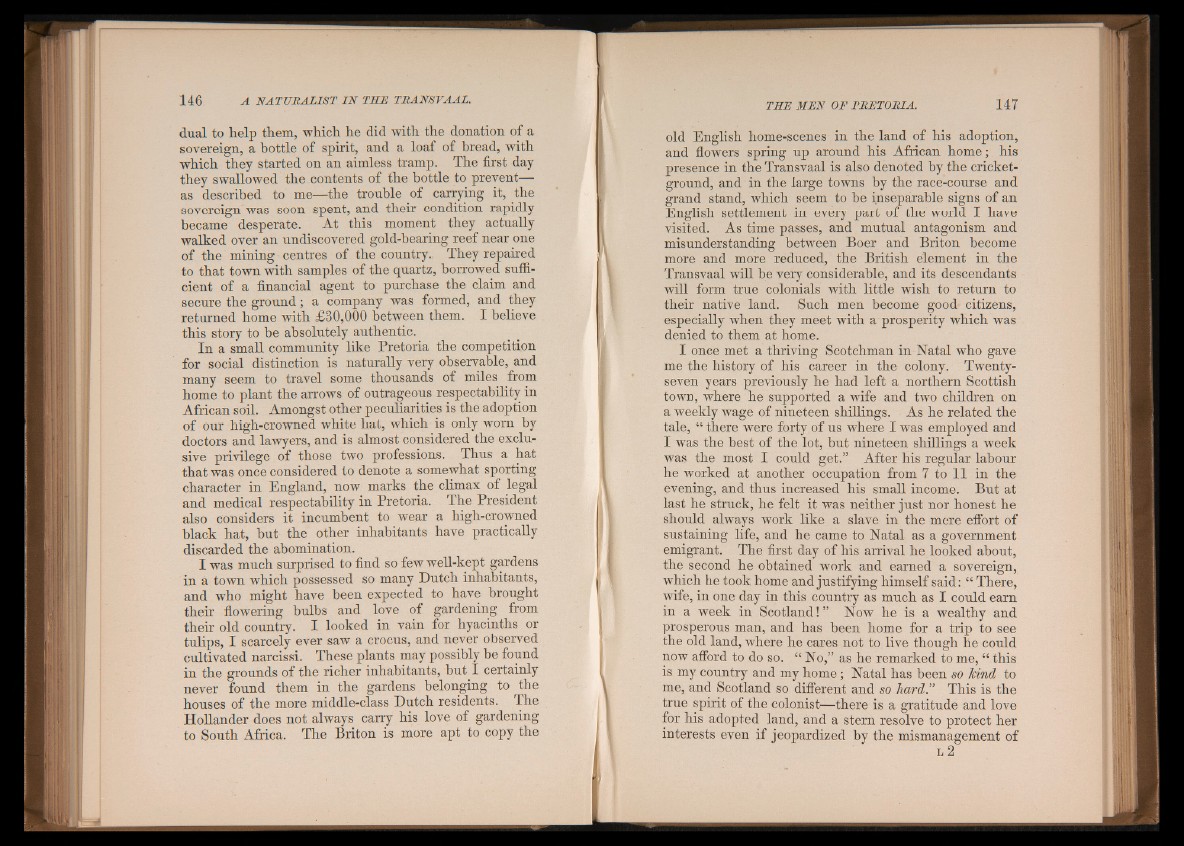
dual to help them, which he did with the donation of a
sovereign, a bottle of spirit, and a loaf of bread, with
which they started on an aimless tramp. The first day
they swallowed the contents of the bottle to prevent—
as described to me—the trouble of carrying it, the
sovereign was soon spent, and their condition rapidly
became desperate. At this moment they actually
walked over an undiscovered gold-bearing reef near one
of the mining centres of the country. They repaired
to that town with samples of the quartz, borrowed sufficient
of a financial agent to purchase the claim and
secure the ground; a company was formed, and they
returned home with £30,000 between them. I believe
this story to he absolutely authentic.
In a small community like Pretoria the competition
for social distinction is naturally very observable, and
many seem to travel some thousands of miles from
home to plant the arrows of outrageous respectability in
African soil. Amongst other peculiarities is the adoption
of our high-crowned white hat, which is only worn by
doctors and lawyers, and is almost considered the exclusive
privilege of those two professions. Thus a hat
that was once considered to denote a somewhat sporting
character in England, now marks the climax of legal
and medical respectability in Pretoria. The President
also considers it incumbent to wear a high-crowned
black hat, hut the other inhabitants have practically
discarded the abomination.
I was much surprised to find so few well-kept gardens
in a town which possessed so many Dutch inhabitants,
and who might have been expected to have brought
their flowering bulbs and love of gardening from
their old country. I looked in vain for hyacinths or
tulips, I scarcely ever saw a crocus, and never observed
cultivated narcissi. These plants may possibly be found
in the grounds of the richer inhabitants, but I certainly
never found them in the gardens belonging to the
houses of the more middle-class Dutch residents. The
Hollander does not always carry his love of gardening
to South Africa. The Briton is more apt to copy the
old English home-scenes in the land of his adoption,
and flowers spring up around his African home; his
presence in the Transvaal is also denoted by the cricket-
ground, and in the large towns by the race-course and
grand stand, which seem to be inseparable signs of an
English settlement in every part of the world I have
visited. As time passes, and mutual antagonism and
misunderstanding between Boer and Briton become
more and more reduced, the British element in the
Transvaal will be very considerable, and its descendants
will form true colonials with little wish to return to
their native land. Such men become good citizens,
especially when they meet with a prosperity which was
denied to them at home.
I once met a thriving Scotchman in Natal who gave
me the history of his career in the colony. Twenty-
seven years previously he had left a northern Scottish
town, where he supported a wife and two children on
a weekly wage of nineteen shillings. As he related the
tale, “ there were forty of us where I was employed and
I was the best of the lot, but nineteen shillings a week
was the most I could get.” After his regular labour
he worked at another occupation from 7 to 11 in the
evening, and thus increased his small income. But at
last he struck, he felt it was neither just nor honest he
should always work like a slave in the mere effort of
sustaining life, and he came to Natal as a government
emigrant. The first day of his arrival he looked about,
the second he obtained work and earned a sovereign,
which he took home and justifying himself said: “ There,
wife, in one day in this country as much as I could earn
in a week in Scotland! ” Now he is a wealthy and
prosperous man, and has been home for a trip to see
the old land, where he cares not to live though he could
now afford to do so. S No,” as he remarked to me, “ this
is my country and my home; Natal has been so kind to
me, and Scotland so different and so hard!' This is the
true spirit of the colonist—there is a gratitude and love
for his adopted land, and a stern resolve to protect her
interests even if jeopardized by the mismanagement of
l 2